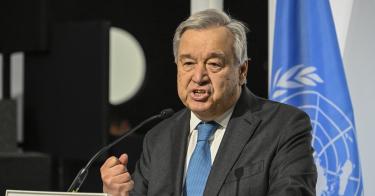In the wake of the 2008 financial crisis, President Obama’s first Chief of Staff, Rahm Emanuel, famously said the quiet part out loud: “You never want a serious crisis to go to waste.” More recently, self-appointed masters of the universe, such as World Economic Forum chairman Klaus Schwab used the COVID pandemic to justify a so-called “Great Reset” of capitalism “to revamp all aspects of our societies and economies.”
Also sensing a moment to capitalize on a crisis, United Nations Secretary-General Antonio Guterres has proposed his own plan to enhance the power of the United Nations greatly and, not so coincidentally, the power of the secretary-general.
As Guterres argues, recent crises “have challenged our international institutions,” and the Summit of the Future, where he will present the details of his plan to world governments, is a “once-in-a-generation opportunity to enhance cooperation on critical challenges and address gaps in global governance.”
Guterres unveiled the contours of his plan in a series of meetings and policy briefs, some still forthcoming. There are eleven such briefs underway, covering topics ranging from “Future Generations” to “Outer Space” to “Beyond Gross Domestic Product” to a “Global Digital Compact” to “Transforming Education” to “United Nations 2.0.”
>>> U.N. Report Castigates Religion for Stymieing the Sexual Orientation-Gender Identity Agenda
This so-called “Pact of the Future” represents a stunning attempted power grab by the secretary-general. These proposals raise serious concerns and objections from the U.S. and other governments that value their sovereignty and that question the wisdom of granting more authority to international bureaucrats and establishing new supra-national rules and institutions that might dramatically impact the U.S. and its future interests.
Among the most concerning policy briefs is one that would grant Guterres authority to “convene and operate an Emergency Platform in the event of complex global crises,” whether that be another pandemic, an environmental crisis, disruptions in global flows of goods, people, or finance, or some other “black swan” event.
Under the proposal, Guterres would be granted “standing authority to convene and operationalize automatically an Emergency Platform” with minimal consultation from governments. Specifically, he would consult in advance the President of the General Assembly, the President of the Security Council, relevant national authorities, regional organizations, and other relevant U.N. agencies and other multilateral institutions “that have been mandated by Member States to respond to sector-specific crises.” There is no requirement to consult with all governments. In other words, the U.N. could take important decisions without input from the U.S.
The purpose of the Emergency Platform is to “overcome obstacles and bottlenecks to an effective response”—i.e., the reluctance of governments to heed the dictates of the U.N. Unsurprisingly, the proposal specifies that “Any response mechanism must ensure that participating actors make clear commitments [such as financial or technical resources or a significant policy shift] that directly and immediately support the global response to a complex shock... Participants would need to accept accountability for delivering on these commitments.”
Indeed, the structure—where Guterres would invite international organizations, experts, academics, and non-governmental organizations to participate alongside governments—seems designed to diminish the authority of national governments and pressure them into cooperation with their decrees.
Rest assured that Guterres and future U.N. secretaries-general will utilize this authority. If you take the U.N.'s word, the migrant, climate, poverty, and debt crises demand urgent attention. Although the “Emergency Platform should initially be convened for a finite period to respond to a specific shock... the Secretary-General could extend the work of an Emergency Platform if required.” Emergency powers are hard to give up once grasped.
But the policy briefs also proffer ideas beyond this that should trouble Americans.
For instance, the policy brief on information integrity calls for developing a “United Nations Code of Conduct for Information Integrity on Digital Platforms that would provide a blueprint for bolstering information integrity while vigorously upholding human rights.” Examples cited of information where integrity has faltered include misinformation and disinformation during the COVID pandemic, “climate denialist content,” and hate speech.
>>> Personnel Is Power: Why China Is Winning at the United Nations
Of course, Americans have seen firsthand how efforts to repress “disinformation” and “misinformation” instead are misused to silence opposing opinions and repress inconvenient evidence, as seen with the Chinese lab leak theory on the origin of COVID. Moreover, countries like China and Russia are eager to censor content and will be delighted to use the U.N. to extend domestic repression internationally. It is hard to see any U.N. Code that would not run roughshod over the First Amendment.
Another policy brief suggests reshaping the international financial architecture to increase investment in “global public goods” like climate action, update the international tax architecture, and make the system more “inclusive, representative and, ultimately, more effective global economic governance.” Developing countries have long clamored for developed nations to provide more assistance, and liberals have long desired global taxes to finance their environmental efforts. This policy brief seems designed to facilitate those objectives.
These are still notional proposals by the secretary-general. The granular details have not been fleshed out. While the Pact will not possess legal force, it will create political pressures on future U.S. presidential administrations. The overarching goal is to aggregate power to the U.N. and the secretary-general and away from the Member States. If all goes according to plan, this effort will culminate with all the world’s governments endorsing the “Pact of the Future” in September 2024.
As reported by The Federalist, the Biden administration has expressed support for the effort, apparently content to subject the American people to the whims of the secretary-general. This is entirely misguided. The President should instead be defending their sovereignty from this naked power grab.
This piece originally appeared in The National Interest https://nationalinterest.org/blog/buzz/un%E2%80%99s-latest-proposals-would-undermine-us-sovereignty-206643



